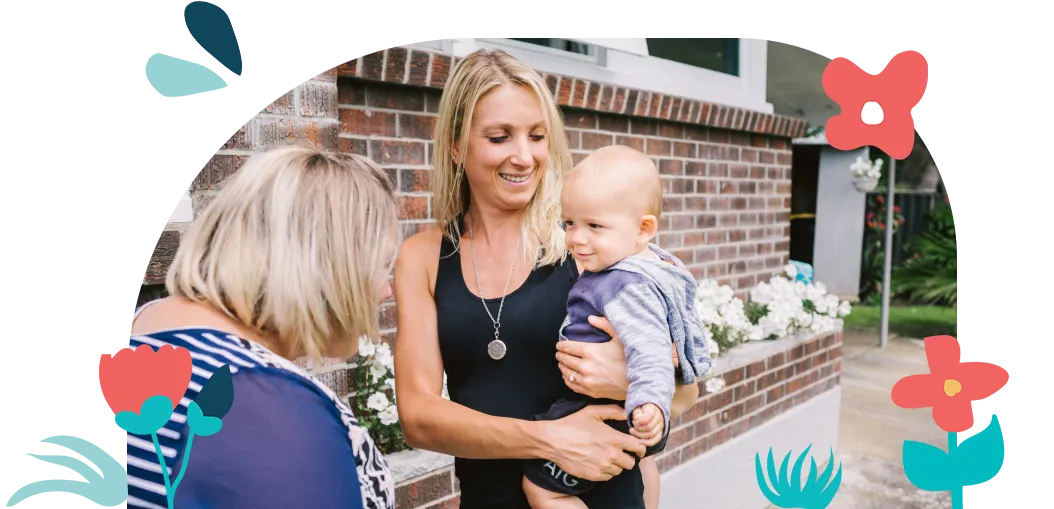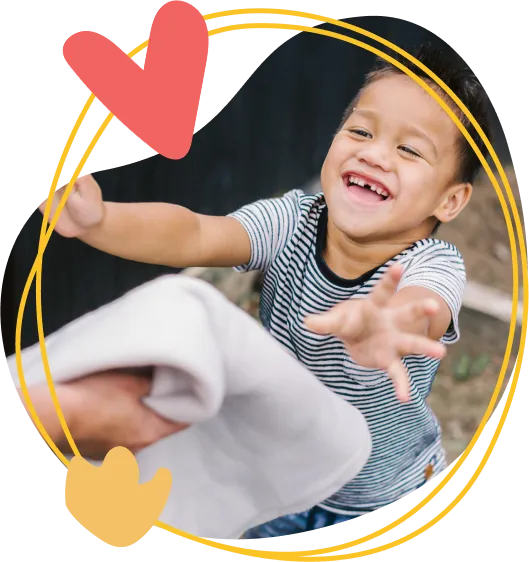We take an easy 4 step approach to the enquiry process
1. Get in Touch
Submit your childcare enquiry. You can phone us or submit your enquiry here
2. We’ll give you a call
During office hours, we’ll give you a call usually within 2–4 hours to learn what matters most to you and your child.
3. Meet Local Educators
We will connect you with available Educators in your area
4. Ongoing Support
We will support you each step of the way to find the right fit for your family
Find an Educator
Start your journey
Select Region
Standing Beside Every Whānau, Every Day
What our support to families looks like
Smaller group sizes significantly reduce health risks for your child, especially considering their still-developing immune systems. There are never any more than 4 tamariki under the age of 6 attending at any given time
Edubase access a range of subsidies and support for whanau. Eligibility criteria applies to some but others, such as the 20 hours ECE scheme for 3+ year olds are not income tested and available to all. You can assess your eligibility at Childcare Subsidy - Work and Income
We process our Educator payments weekly. Our systems are robust and accurate and you can rely on us to get payments processed to your Educator on time, every time. We have a range of payment methods available but an administration fee discount is available to families who choose to pay by direct debit. The nominated bank account is debited by the exact amount of care fees bringing your account balance to zero each week. No messy catch up payments or refunds to process.
We are also equipped to send quarterly statements to families to enable them to lodge this with IRD for FamilyBOOST payments. for more information go to FamilyBoost
Many of our Educators use HomeZone - our online Student Management System (SMS) to record sleep, food (where required) and nappy changing/toileting (if requested) You’ll know beforehand if your child with be venturing out of the home on any given day, how long they’ll be gone and when you can expect them back in the home. All of the regular activities your child attends outside the home, you will have consented to after reading the assessment of risk and supervision plan. This could be recorded on paper or electronically via HomeZone.
Special Excursions are one off outings that occur. You’ll sign your approval on a case by case basis for these. Examples of a special outing may include a trip to the museum, zoo or venues such as Butterfly Creek in the north or strolling the gardens at the Invercargill Water Tower! Each outing will have an educational focus attached to it.
Learning experiences are customised to meet your child's individual needs, rather than attempting to satisfy a larger group of children, now, that is tailored learning
Parents are encouraged to take an active role in the daily operations of the Organisation and in their child’s learning. They are invited to participate in policy review as part of the consultation process, and we value parent feedback through platforms like Storypark or via email or HomeZone - our Student Management System. The Visiting Teacher who supports a group of Educators is available for phone or in-person connections if requested and will contribute to your child’s learning at least monthly via Storypark. They’ll regularly visit your child while they are attending and provide a narrative overview of their current strengths, interests and development. Educators plan for children in a variety of ways, most use Storypark to plan and communicate with families on their child’s learning, often using photographs and stories
We support and encourage our Educators, as independent small business owners, to foster connections with families inside their social or professional settings. Self referrals and word of mouth are often the number one way for connections to be made. It doesn’t mean your family receive any less benefits from us as your service provider
We have established links over the years of operation with external agencies to support our tamariki and whanau who have additional learning needs. Our diverse learners are an important part of our Edubase community and we’ll stand alongside you and fight where necessary to get support in place where needed. No family should feel alone when it comes to finding the right help to build the best future for their child
We take pride in our Health and Safety procedures and have robust systems in place for monitoring the well-being of our tamariki in care. Initial and ongoing regular premises checks guide our Educators practice in this space with documentation and tools required. We embrace technology and have a range of health and safety functions available electronically including outings and excursions, sleep and food records
Our Strategic Plan that guides our Organisation. Part of that plan includes the statement ‘Demonstrating a commitment to our people, through providing continuous learning and growing opportunities.' Edubase has a range of in house Professional Development webinars, resources and handouts available to support Educator knowledge. We partner with Educators to ensure they are receiving the level of PLD that they expect from us as their service provider. Periodically we will provide externally sourced PLD facilitated by experts in their field fostering growth and ongoing learning to benefit our end user, our tamariki
On occasions, your chosen Educator may need to close their service for a short period of time. We feel the benefits Home Based childcare offers families far outweigh the inconvenience of the occasional absence. In most of our regions we we are able to offer families backup care (we call it temp or alt care). This is arranged either directly between yourself and your Educator or could be facilitated via your Visiting Teacher. Fees are charged at the temporary Educators rate and families accept that rate as a condition of attending care

Family matching process that truly looks at best outcomes for your child
We Listen. We Match. You Choose
Finding an Educator for your whanau means the unique interests and strengths of tamariki can be supported in smaller groups, allowing for tailored, child-led, and play-based learning experiences that foster brain development, and of course, are FUN!
The usual routine from home to care, including sleep and meal times, can be maintained, providing consistency for your child, particularly for our under 2 year olds.
Your child can relish everyday childhood activities such as going for walks, collecting the mail, hanging out the washing, and participating in larger group experiences like playgroups and outings.
Our matching process not only looks at location but also at features specific to your needs and the needs of your child. Families and Educators co-drive this process by meeting and discussing care needs and expectations before any agreements are reached. It’s a way that fosters open communication from the beginning of the relationship.

Looking for the right childcare option for your whānau?
let’s find the perfect fit together.
Big Steps, Soft Landings
Preparing for the first day
Many children need time to adjust and settle into new environments and get to know new people. We encourage families to visit their Educator as needed before care begins, allowing your child the chance to become familiar with them, their surroundings, and their future friends. Your Educator will be able to give guidance through their experience on settling children as well.
At enrolment, we’ll also gather information from whānau that is important to them before their first day, helping us to connect and understand both you and your child better

Start with a Simple Ritual
Creating a ritual for care days can be soothing. This routine can help build a comforting bridge between home and their new environment
Pack a Piece of Home
Packing a comfort or familiar item is reassuring. Whether it’s a beloved teddy bear, a cozy blanket, or a family photo, these items can help provide connection and calm
Trust in the Journey
Trust the community you’ve chosen. Educators are naturally nurturing, ready to welcome your child with open arms, fostering learning, friendship, and growth. Moving through the settling phase into a regular routine is a milestone moment to be celebrated
Tip:
Remember, you’re not alone. We’re all in this together, supporting each other.
Here’s to a first day filled with wonder and new friendships








